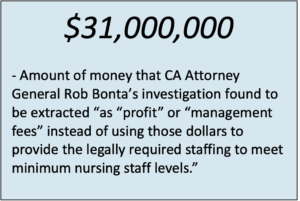The Senior Care Policy Briefing covers important long-term care issues by highlighting policy updates, news reports, and academic research.
Read the full Senior Care Policy Briefing below or download here.
September 2, 2025.
NEWSFLASH
- New York Attorney General James announced a $12 million settlement with the owners of a Syracuse nursing home after her investigation uncovered years of financial fraud, neglect, and resident harm.
- Why is this important? New York and other states are increasing Medicaid payment rates to nursing homes despite evidence of persistent and widespread financial fraud and misuse of taxpayer funds.
- Read LTCCC’s special alert on the AG’s settlement.

- A Health Affairs commentary warns that the 2025 budget bill (H.R.1) could limit Medicaid access to nursing homes, threatening residents and families who rely on it. Instead of cutting coverage, authors Charlene Harrington and Jeoffry Gordon argue that savings should come from reforms to stop hidden profits and ensure funds go to staffing and care. They call for greater financial transparency, requirements that most revenues be spent on direct care, and limits on private equity and REIT ownership of nursing homes.
- A new report from the Center for Medicare Advocacy emphasizes that meaningful nurse staffing levels in nursing homes are achievable when facilities use evidence-based, acuity-driven methods to match staffing to residents’ actual needs. Although courts have struck down parts of the federal staffing rule, the facility assessment requirement remains in effect, obligating nursing homes to continually self-assess to ensure that they are providing sufficient staffing and services to meet the clinical and psycho-social needs of every resident.
- This principle is already being utilized in court. For example, California Attorney General Bonta cites the acuity-based staffing methodology in his lawsuit against Sweetwater Care after finding that the nursing home operator’s “unlawful level of understaffing led to patients… being exposed to preventable neglect, abuse, and injuries” in its California facilities.

RESEARCH ROUNDUP
- A new study which reviewed state and federal nursing home staffing standards found that nursing homes in states with higher staffing standards had better quality ratings and lower turnover.
- Researchers in Finland found that nursing home residents who stopped taking antipsychotic drugs were 12% less likely to be hospitalized within a year than those who continued.
- Since antipsychotics carry serious risks and often provide little benefit for people with dementia, regularly reviewing and discontinuing these drugs when appropriate can help keep residents safer and improve quality of life.
